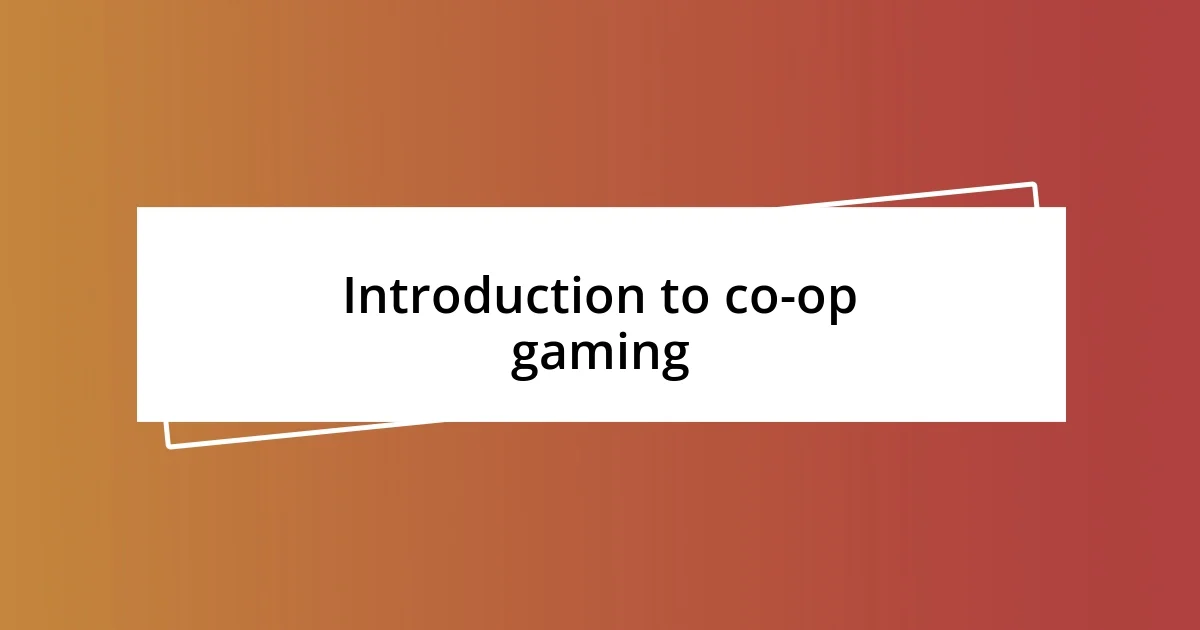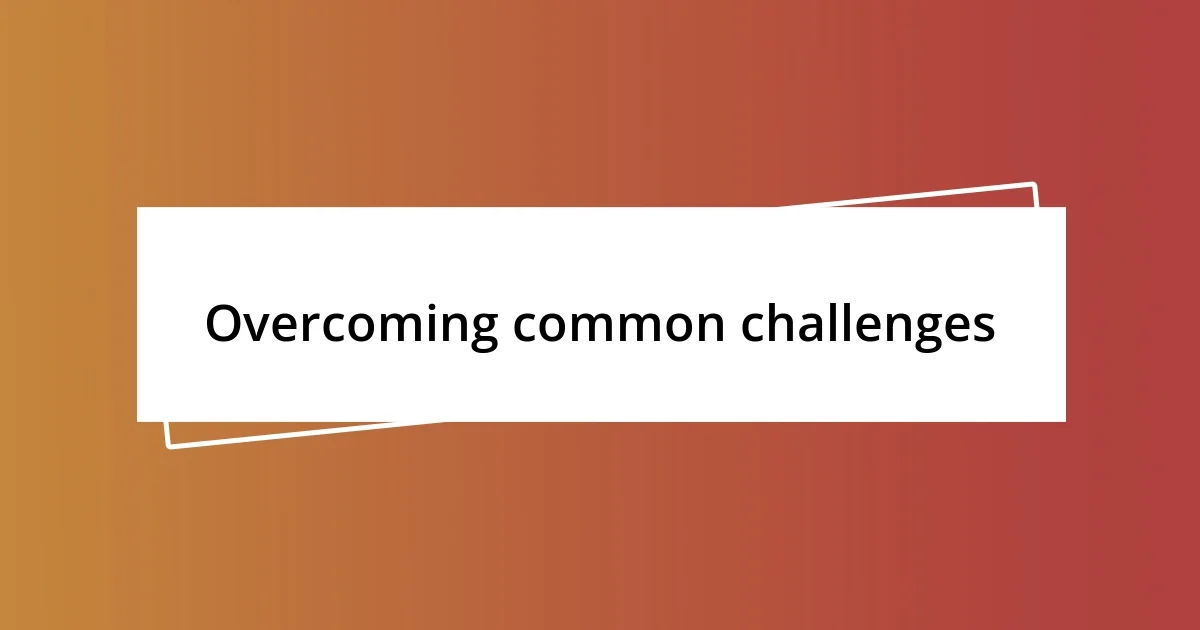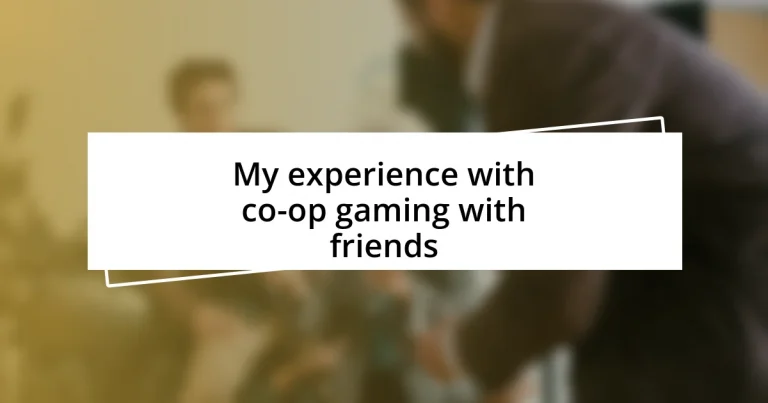Key takeaways:
- Co-op gaming fosters connection and teamwork, transforming gaming sessions into memorable shared experiences with friends.
- Choosing the right games and setting up a suitable gaming environment, including comfort, equipment, and snacks, can enhance overall enjoyment for all players.
- Effective communication and teamwork strategies, such as defining roles and being open to feedback, are essential for overcoming challenges and achieving success in co-op gaming.

Introduction to co-op gaming
Co-op gaming, at its heart, is about collaboration and connection. I still remember the thrill of my first multiplayer experience, huddled around a screen with friends, strategizing and laughing as we tackled challenges together. There’s something special about working towards a common goal that creates not just excitement but also lasting friendships.
What I’ve always found fascinating about co-op gaming is how it brings people together, even from a distance. Whether online or in-person, sharing victories and defeats creates a unique bond. Have you ever felt the adrenaline rush when everyone finally aligns their strategies to conquer a tough level? It’s like a mini-celebration every time you achieve something as a team.
In my experience, co-op games often feel more like shared adventures than mere entertainment. The emotions run high, and the laughter is contagious when you navigate through virtual worlds with friends. These moments linger in my memory, turning simple gaming sessions into treasured experiences that enrich our relationships. What has your co-op gaming journey been like?

Choosing the right games
When it comes to choosing the right games for co-op play, I’ve learned that the key is to consider the interests and skill levels of everyone involved. There’s nothing worse than gathering friends, only to find out that one person is struggling to keep up while others are breezing through the game. I remember one night when we picked a fast-paced shooter, and while I loved the intensity, my friends felt overwhelmed. It turned into a frustrating experience rather than the fun night we’d hoped for.
To avoid mismatched experiences and ensure everyone has a good time, I often keep these factors in mind:
- Playstyle Variety: Consider games that offer different roles or playstyles to accommodate everyone’s preferences.
- Difficulty Levels: Look for games that allow you to adjust difficulty so everyone can participate without feeling left behind.
- Theme and Genre: Choose themes that resonate with all players; a shared interest can amplify enjoyment.
- Game Length: Be mindful of how long a game session will last—some friends prefer quick rounds, while others enjoy lengthy campaigns.
- Accessibility: Ensure that the game’s mechanics are intuitive enough for all skill levels, promoting engagement instead of frustration.
In my experience, balancing these aspects not only enhances the game night but also fosters a more inclusive atmosphere, making each session something everyone looks forward to.

Setting up the gaming environment
Setting up the gaming environment is just as crucial as selecting the right game. I discovered this firsthand when I tried hosting a game night at home for the first time. It was a bustling adventure filled with snacks, drinks, and friends, but I quickly realized my living room setup was not ideal for gaming. The couch was too far from the screen, making it hard for everyone to get into the action. After that experience, I invested in a few comfy chairs and a better TV arrangement, transforming our game nights into a more engaging environment.
Having the right equipment can make all the difference. I remember a time when we attempted to play an intense co-op game on a smaller screen, and it just didn’t work. Everyone was squinting and leaning closer, which turned our session into a comedy of errors rather than the epic win we had hoped for. Now, I always ensure that we have a large screen, reliable audio, and comfortable seating. This way, the focus is on the game, not on whether someone can see or hear properly.
Lastly, creating a fun and inviting atmosphere with good lighting and snacks is essential. I’ve found that dimmed lights paired with some mood-setting music can elevate the excitement before the game even starts. My friends and I often bring our favorite snacks, which has become a tradition in itself. It’s funny how something as simple as a bowl of popcorn can spark conversations and laughter, adding to the camaraderie of the gaming experience. Here’s a quick comparison of key elements for setting up your gaming environment.
| Element | Considerations |
|---|---|
| Seating | Comfortable, accessible arrangement for all players |
| Screen Size | Large enough for everyone to see clearly |
| Audio Setup | Ensure clear sound without distractions |
| Lighting | Adjustable lighting to set the mood |
| Snacks and Drinks | Easy access to keep the energy levels high |

Communicating effectively during play
When it comes to effective communication during gameplay, I’ve discovered that clarity is key. I remember one particularly chaotic session where we all had different strategies but failed to express them clearly. It ended up in confusion, and we lost the game in record time. Now, I always encourage my friends to vocalize their plans and ideas. Sharing our thoughts not only helps track progress but also builds that team spirit that makes co-op gaming so enjoyable.
In my experience, using simple phrases like “I need help here!” or “Focus on that enemy!” can make a significant difference. These quick calls to action help everyone stay on the same page, particularly during high-stakes moments. I often wonder, how many games could be saved with just a little more communication? I’ve learned that being proactive in expressing thoughts can lead to much more cohesive gameplay and less frustration.
Non-verbal cues also play an essential role. A simple thumbs-up or wave can often convey what words can’t express, especially during intense moments. I find myself relying on these cues, especially when the game gets loud and chaotic. One time, we were with friends in a thrilling race, and instead of shouting over each other, we used hand signals to coordinate our moves. It was both effective and amusing, showcasing how we could create a fun atmosphere while enhancing our strategy!

Strategies for teamwork success
One powerful strategy for teamwork success in co-op gaming is establishing clear roles among players. I remember diving into a complex dungeon raid where half the team forgot who was assigned to tank, healer, or DPS (damage per second). It felt chaotic, and we faced defeat over and over. So now, I make it a priority to clarify roles before diving in. Knowing who does what helps streamline our objectives and allows everyone to focus on their strengths, creating a smoother gaming experience.
Another key element is celebrating small victories together. I’ve experienced the morale boost that comes when we complete a challenging task, like defeating a tough boss. Instead of just moving on, we take a moment to acknowledge our teamwork and high-fives ensue, reinforcing that bond. I often ask my team, “How does it feel to crush that?!” It truly adds a layer of joy to our sessions and keeps everyone motivated, even when faced with the more grueling aspects of the game.
Lastly, flexibility can be a game-changer. There was a time when we faced an unexpected challenge, and rather than sticking rigidly to our initial plan, we adapted on the fly. I suggested switching roles mid-game, and it turned out to be a brilliant move, leading us to an unexpected victory. I often ponder—what if we hadn’t been open to change? The ability to pivot not only enhances our strategy but also fosters a collaborative spirit among players, turning potential setbacks into opportunities for triumph.

Overcoming common challenges
One common challenge I’ve faced in co-op gaming is dealing with diverse skill levels among friends. I recall a specific instance where a novice player joined our group for a mission, and I noticed their hesitation. Instead of pushing through at our usual pace, I took a step back and offered guidance, like showing them basic moves or strategies. It was a bit frustrating at first, but once they started to catch on, the joy in their voice was infectious! How often do we forget that patience can turn a potential barrier into an opportunity for everyone to learn together?
Another hurdle I often encounter is maintaining engagement when tensions rise or when things don’t go as planned. I remember one night when a particularly tough puzzle stumped us for what felt like hours, leading to frustration in the group. Sensing the mood shift, I suggested we take a quick break, grab some snacks, and come back refreshed. I can’t emphasize enough how that small, informal break reignited our focus and turned an awkward stalemate into a fun bonding moment. Have you ever found that a brief pause can be the secret ingredient to a successful comeback?
Lastly, integrating feedback during gameplay can be challenging but incredibly rewarding. There was a moment when a friend provided a suggestion, and I was tempted to dismiss it because I thought I had a better approach. However, I paused and considered their idea, eventually realizing it could enhance our strategy. That kind of openness not only improved our gameplay but also reinforced trust within our group. Isn’t it fascinating how valuing each other’s perspectives can elevate the gaming experience for everyone?

Conclusion and future gaming plans
Reflecting on my co-op gaming experiences, I see just how vital it is to establish a strong connection with friends during playtime. Recently, I made a pact with my gaming buddies to schedule regular sessions, turning play into a consistent ritual rather than just a pastime. This not only strengthens our teamwork but also cultivates camaraderie that spills over into our everyday lives. Doesn’t it feel great to look forward to something shared?
In terms of future gaming plans, I’m excited to explore games that challenge us in new ways. I often find that venturing into genres we’ve never tried—like survival games or puzzle adventures—can unveil hidden talents within our team. I look back on my first experience with a survival game; I never imagined my friends would excel at strategy under pressure. Isn’t it thrilling to discover unexpected strengths in your friends?
As I anticipate our upcoming sessions, I also plan to integrate more storytelling elements into our gameplay. Immersing ourselves in the narrative gives us a chance to connect deeper, feel invested in our characters, and relish in the journey. I remember when our team became so wrapped up in a game’s plot that we genuinely celebrated the twists and turns. It’s moments like these that remind me why gaming with friends is so special—it’s not just about the victory, but about the stories we create together.














